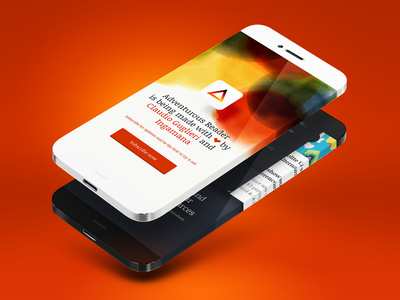
Not every startup should go mobile, so as not every startup initially exists as a mobile app. How to deal with the challenges and risks when transferring to mobile platform? Should you even turn your project into an app for a mobile OS?
The high-speed "mobilization" has borne itself out. The 78% of daily Facebook users in the U.S. access it from a mobile phone. For Twitter, the same criteria is about 75%, with the 65% of profit from mobile advertising.
Surely, this percentage bred a big fuss about mobile development and applications. Startup-newbies try profiting, but spend too much time and resource choosing the wrong path, so they end up failing. This is the topic we are happy to cover today.
False #1. Only cross-platform app pays off
The Truth: Nope, if you want a five-star rating, release a native app.
It seems like cross-platform mobile application development is profitable. Write the good code once and upload it to all of your websites. Yep, Facebook, LinkedIn, and Southwest Airlines once thought the same. However, later Mark Zuckerberg admitted that the blind faith in the almighty power of HTML5 was one of the FB's biggest mistakes.
Southwest Airlines, for instance, still use the universal app. Somehow their app is repeatedly used as the example of the worst app in the App Store. Doesn’t take to be the great Sherlock to draw a right connection between these two facts.

Startups with strictly limited resources are more likely to choose the cross-platform mobile development, especially when they don’t plan different promotion strategies for each mobile OS. Instead of hiring specialists for intelligent native app development, they count on the hybrid HTML5 creators and sets to create a one application for the ages. Usability, layout and functionality will work out pathetic, but there are more drawbacks:
Instead of wasting your time, examine the platform from which you plan to begin the transition to mobile devices. First, learn the preferences of your target audience: you might be surprised to find out that iOS or Android is not that popular among your users.
Then you’ll be able to determine the range of tasks that can be solved with the help of a mobile application. After that – go ahead and develop an app specifically for this platform. It is better to work out the details on particular platform and make one award winning goodie instead of ten boring apps.

False #2. Your backend infrastructure is completely ready for mobile apps
The Truth: You’ll have to upgrade, update or even rebuild the entire infrastructure to support applications properly.
Now smartphones consume more traffic than some laptops. And it is essential to adjust your hardware for selected mobile API, considering traffic and website workload. Usually at successful implementation, the growth of traffic and load makes up to 200%, so you need to be able to handle this. When configuring the server for Mobile API, take into account a number of parameters:

False #3. You can create a mobile app inside your company as quickly as an outsourcing team
The Truth: Brace yourself, because developing an application yourself will take almost 4x the time.
New startups frequently misbelieve that they are able to go mobile on their own. When a contractor says that the development will take a month or three, a startup manager may think it’s too long and decides to build internally. Sometimes the team actually does that and launches the app, but spends 4 months instead of one.
It’s not like your in-house team isn’t good enough, sure your guys are great. However, usually the full-blown development means bringing in the specialists with particular niche skills like ability to test mobile products, write specific mobile interface and assure topnotch QA. For a new team, it’s impractical to hire full time professionals on a short term.
Hiring the contractor for mobile app development, you’ll access all the above said engineers to work in parallel with your team. Moreover, outsourcing companies already have the project manager with experience to effectively coordinate the work of all technical specialists.
Outsourcing means not only the speed, but also the quality of your app.
Choosing the contractor, have a look at company's portfolio; evaluate its professionalism and trustworthiness. Ask your future outsourcer a few questions, like:

False #4. Starting to work with the external company, you’ll stuck with it forever
The Truth: Cooperation with the outsource developers at the beginning will help you in the future to create and update your product.
All contractors are different. Some of them are skillful consults, some are the must have QA engineers and some develop like freaking gods when working with your in-house team. The last one contractor is just the type you need to draw a line between your and their work at some point. After that, you are practically ready to handle the app updates and technical support on your own.
It’s a typical practice to avoid outsourcing for new startups. Newbies are afraid of eternal dependence from the contractor, and long-term cooperation will cost a pretty penny. But the trustworthy outsourcer doesn’t have the goal to drain you dry. You just outline the terms of cooperation and the pace of development, the number of versions and updates that you want to release in conjunction with the contractor. Then no one will feel obligated to anyone.
Cooperation should be based not only on the work among engineers, developers and QA specialists. It is also necessary to work with the designers and to attract professionals of different skill levels. Testing, debugging, revision making – when it comes to the mobile version, they become complex processes that need to scale with the growth of your startup. To do that, you’ll need to bring in more professionals from both sides. Over time, you will be able to carry out these processes on your own.

False #5. Outsourcing your app development means an easy-breezy time spending
The Truth: Actually, you still should work with the contractor on the app to get the desired results.
It is a common mistake to suppose that someone can get in your boots and design the app perfectly according to your dreams. Even the most talented contractor developing by detailed specifications is incapable of becoming you.
You’ll want to work closely with the outsourcing engineering, design and QA teams. QA-teams contractor and involve both its own and third party managers. Right communication helps the project to avoid mistakes and play a guessing game: you’ll get exactly what you imagine. Period.
First choice would be contacting the developers daily to be aware of all the processes. It eases up the in-time mistake fixing and feedback receiving. You just can’t replace the personal communication with formal reports.
Ultimately, choosing the right path depends on finding the right outsourcing partner. You want to work with someone who gets you, gets your app’s needs, and is as dedicated to your project as you are. Especially when you are new to the mobile application market, or you are a smaller startup – finding this exact compatibility with the outsourcer brings not only your mobile strategy to the whole another level, but your entire venture too.